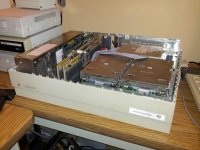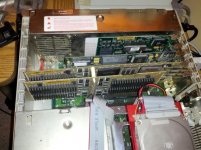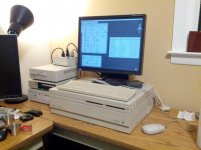compu_85
Experienced Member
I saw this system pop up on craigslist near me... later that evening it was in the trunk of my car. The gentleman I got it from was doing artificial intelligence work for the Navy. Quite a fancy machine in its day...
A MacII which has been upgraded to a IIFX.
32mb of ram, 80mb hdd (I have since upgraded this to a 2.1GB)
Syquest drive, tape backup (which uses standard audio cassettes!), 270 mb external HDD, Ethernet card, Radius card
and...
The Texas Instruments MicroExplorer system. This is basically a computer on a card (well 2), with it's own memory (8mb in this case) and processor running a Lisp enviroment.
Did I mention it came with PILES of documentation? And 3 versions of the software for the TI card!
I did some looking around online, and couldn't find any copies of the software, even on BitSavers. I spent an evening making images of all of the disks, and they were all readable!
These are in Diskcopy 4.2 format.
http://compu85.homeip.net/stuff/ti/
Unfortunately in all of the documentation there was no install guide. I'm still trying to get the system to load up. I'll be messing with it more soon!
Here are some pictures of the machine. Note the double, full length card. That's the TI system.



I have the original 14" CRT, but it's able to drive the 19" LCD just fine.
Thanks!
-Jason
A MacII which has been upgraded to a IIFX.
32mb of ram, 80mb hdd (I have since upgraded this to a 2.1GB)
Syquest drive, tape backup (which uses standard audio cassettes!), 270 mb external HDD, Ethernet card, Radius card
and...
The Texas Instruments MicroExplorer system. This is basically a computer on a card (well 2), with it's own memory (8mb in this case) and processor running a Lisp enviroment.
Did I mention it came with PILES of documentation? And 3 versions of the software for the TI card!
I did some looking around online, and couldn't find any copies of the software, even on BitSavers. I spent an evening making images of all of the disks, and they were all readable!
These are in Diskcopy 4.2 format.
http://compu85.homeip.net/stuff/ti/
Unfortunately in all of the documentation there was no install guide. I'm still trying to get the system to load up. I'll be messing with it more soon!
Here are some pictures of the machine. Note the double, full length card. That's the TI system.



I have the original 14" CRT, but it's able to drive the 19" LCD just fine.
Thanks!
-Jason
